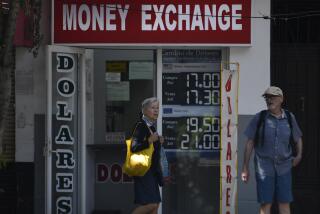When it’s time to pay, choose plastic over paper
- Share via
Travelers contemplating a trip abroad probably know the bad news about the weakness of the U.S. dollar against many foreign currencies. The British pound, for which Americans paid $1.40 in 2002, now costs about $1.85, and the euro, which was even with the dollar as recently as July 2002, now costs about $1.30.
Travelers obviously have no control over currency exchange rates, but they can make the most of common-sense measures. Here is what some experts and seasoned travelers suggest:
Put it on plastic: Use credit cards for every possible purchase.
“As far as most of the world is concerned, the major credit cards are the new international currency,” said Ian Eastment, a retired publishing executive who lives in London and traveled extensively in his career. He and his wife, Alison, own a home in Spain, so they travel frequently between currencies. “You really only need cash for taxis, newspapers, coffees and, of course, anything you’d rather not have a record of having purchased.”
The exchange rate for credit cards is pegged to a daily, published interbank rate. Currency exchange booths in airports, hotels and foreign cities often inflate their exchange rates.
“You’re never going to get near the official conversion rates quoted in the financial pages,” Eastment said. “You’re going to exchange your cash at what is euphemistically known as the ‘tourist rate.’ ”
Fees for currency exchange using a credit card vary from 1% to 4%, depending on the credit card issuer. “I always recommend using a credit card,” said Judy Lucas, a cruise expert with Concierge Cruises in Tucson. For couples, “each of them needs to carry a different credit card. Keep one locked in a hotel safe or your cabin in case, God forbid, you have your wallet stolen or purse snatched.”
If a card is lost or stolen, it can be canceled and replaced. Bob Schwartz of New York, retired chief administrative officer of United Artists Pictures, has traveled internationally for business and pleasure since the 1950s and takes along a copy of his credit card numbers and the overseas phone number of the card company just in case.
“I keep a separate listing of my credit cards so if ... they’re lost or stolen, I have copies of everything instantly,” he said.
Schwartz, who recently returned from Japan, also points out another advantage to using certain kinds of credit cards: frequent-flier miles.
“Charge as much as you can on your credit cards and keep adding up mileage,” he said.
If there is a problem with a purchase, there is a resolution process with a credit card transaction that a buyer doesn’t have with cash or traveler’s checks.
Use an ATM: Forget the traveler’s checks and find an ATM.
As ATMs have become more common around the globe, many travel experts recommend using them for cash rather than exchanging U.S. currency or traveler’s checks.
“I really recommend people use an ATM,” said Kathryn Sudeikis, president of the American Society of Travel Agents. “There are no surcharges other than $1.50 or $2.50 [for using an out-of-network ATM], plus there aren’t the currency change charges. The one caveat is you can only take out so much cash per day.”
Sudeikis learned this the hard way. She used her ATM card to get cash for theater tickets in London and then couldn’t withdraw any more cash that night to pay for dinner. (Check with your bank before you go to find out how much local currency you can withdraw each day.)
When using an ATM, withdraw only as much cash at a time as you are comfortable carrying.
“It’s safer to use an ATM and only withdrawing X amount of dollars at a time,” Sudeikis said.
Be cautious about where you are withdrawing cash, Lucas said. ATMs can be crime targets in any country, including the U.S. Be sure you are in a safe, well-lighted place with plenty of people around. Lucas also notes that camera phones can video record your PIN while its owner appears to be talking on the phone, so be wary.
In the face of declining use of traveler’s checks, American Express and other credit card issuers have created a debit-style card that can be loaded with money in advance. Having a finite amount can help some spendthrifts stay on a travel budget. The cards generally are accepted wherever the credit card is and can be used to withdraw cash in the local currency. American Express allows travelers to load the card in U.S. dollars, euros or pounds. Loading the card in a foreign currency in advance gives the traveler the knowledge that a euro spent today isn’t going to be any more (or less) expensive than a euro spent tomorrow.
Carry cold cash: Take some greenbacks.
Though the value of the U.S. dollar has been in decline, it is still one of the most accepted currencies. Keep some cash tucked away. And it’s good to have a little cash when you get home.
Sudeikis recommends taking along $200 in fives and twenties “on the off-chance the ATM isn’t working” and also recommends going to the bank and asking for $50 to $100 in crisp new $1 bills to use as tips until you get the local currency figured out.
But be careful where you exchange cash; it can cost you more than it needs to.
“Often, when I’m traveling, things are so hectic, it’s difficult to do much more than avoid the obvious rip-offs like exchanging currency at a hotel,” said Casey Fenton, founder of the website www.couchsurfing.com.
Hotels and local currency exchange booths have among the worst exchange rates and fees. Despite their convenience, they can add unnecessary expense to an already expensive currency.
“Always do it at a bank, post office or at the official bureau de change counter at the airport,” Eastment said. “Never exchange money at your hotel. They usually have exchange rates that will make your eyes water.
“Similarly, if a shop ... tells you that they’re ‘happy to accept dollars,’ always check what exchange rate they’re using. You may discover why they’re so happy to accept them.”
Don’t change back: Exchange only what you can use.
Exchanging foreign currency back into dollars doubles whatever fees you may have incurred.
Any cash at the end of your stay can be applied to a hotel bill. Even spending it on gifts in duty-free shops at the airport makes more sense than converting.
More to Read
Sign up for The Wild
We’ll help you find the best places to hike, bike and run, as well as the perfect silent spots for meditation and yoga.
You may occasionally receive promotional content from the Los Angeles Times.






